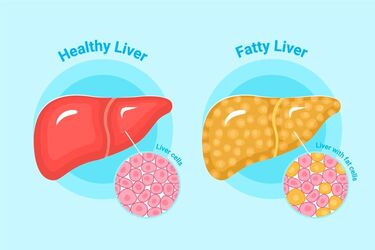5 tips on how to prevent fatty liver disease

What to eat to lose weight? This seems to be the basic query of millions of people around the world. But nutritional choices affect not only your waistline or blood pressure, but also your liver health. Today, when after a long day of work we most often choose fast food for dinner, the question of a healthy diet for the liver is more relevant than ever.
According to scientists, non-alcoholic fatty liver disease affects one in four people on Earth. The disease can cause cirrhosis, liver failure and increase the risk of liver cancer. Thegood news is that it can be prevented or reversed by following simple dietary guidelines, hepatologists believe.
Why is fatty liver disease so common?
Non-alcoholic fatty liver disease is one of the most common chronic diseases in the world, in which too much fat accumulates in the liver. In the United States alone, about 100 million people have NAFLD. Although the exact causes of the disease are still unknown, but most often it is associated with obesity and unhealthy lifestyle. Most modern people suffer from fatty liver disease to some degree. If nothing is done, the disease can take a dangerous form in which the liver becomes swollen and damaged by fatty deposits, which in turn can cause cirrhosis and even liver cancer.
NAFLD is most common in people:
- with high blood pressure;
- high cholesterol;
- insulin resistance or type 2 diabetes;
- overweight or obese, although it is possible to develop the disease even if you have a normal body mass index.
Stop and prevent: top 5 healthy eating habits
According to clinical hepatologist and Harvard Medical School faculty member Kathleen Viveiros, nutrition can play a huge role in preventing fatty liver disease. Since FATLD is closely linked to metabolic health, a healthy diet can help prevent or even reverse the problem.
The best example of a healthy diet is the Mediterranean diet, which includes lean protein foods including fish and poultry, healthy vegetable fats, vegetables, fruits and nuts, experts say.
Being overweight or obese is a common cause of NAFLD, so doctors recommend gradual weight loss through diet and calorie deficit. This in turn can help control blood pressure, cholesterol and blood sugar levels. Currently, there is no conclusive evidence to support the benefit of any particular diet. Nevertheless, these recommendations that promote liver health are substantiated by research.
- Avoid fast food: too much fat and sugar
A recent study published in the scientific journal Clinical Gastroenterology and Hepatology linked regular consumption of fast food - more than 20% of total daily calories - to fatty liver disease.
According to the scientists, people with type 2 diabetes or obesity should be especially selective in their diet. "Fast food" tends to be high in saturated fat and sugar, which affect metabolism.
- Avoid soft drinks and sugar-sweetened beverages
Soft drinks with corn syrup, high fructose or other sugar-sweetened beverages, significantly increase fat deposits in the liver. This does not depend on how many calories per day you consume. Read labels carefully for sugars, including corn syrup, dextrose, honey and agave. Instead of sugary drinks, experts recommend drinking pure water, black coffee or coffee with cream, without sugar. Numerous studies show that coffee can reduce liver scarring.
- Say no to alcohol
Any alcoholic beverages can damage the liver, they have no nutritional value and can affect a healthy microbiome. Experts recommend giving up alcohol completely for patients with NAFLD.
"We don't know what amount of alcohol is safe for people with fatty liver disease - even drinking hard drinks 'for company' may be too much," says Dr. Viveiros.
- Whole foods are the best choice
Vegetables, fruits, berries, eggs, poultry, grass-fed meats, nuts and whole-grain foods are great for keeping your liver healthy. Experts recommend avoiding red meat. In an 18-month study involving 294 people with obesity and lipid imbalances, patients were divided into 3 groups based on diet type:
- Standard healthy eating guidelines;
- traditional Mediterranean diet;
- green-Mediterranean diet with the exclusion of red meat and the addition of green tea instead of dinner.
All three groups lost some weight, although patients in the Mediterranean diet group lost the most weight and kept it off for a longer period. Both Mediterranean diet groups also showed a reduction in liver fat after 18 months, but the rate of fat reduction in the green-Mediterranean diet group was twice as high.
- Healthy fats as part of a healthy diet
We all need fat, scientists believe. Dietary fats help the body absorb vitamins, they are also vital for protecting nerves and cells. Fats provide a feeling of satiety, so the likelihood of overeating is reduced. Skim foods are often replaced with sugar or starch, which affect the regulation of blood sugar levels in our bodies. But not all fats are beneficial. Apparently, Mediterranean-type diets can reduce fat deposits in the liver, thus preventing fatty liver disease. These diets are rich in healthy fats:
- monounsaturated fats, which are found in olive oil and avocados;
- omega-3 fats found in walnuts and fatty fish.
As you can see, stopping fatty liver disease is a doable task. In today's world we spend too little time cooking healthy and balanced food, because it is much easier and faster to buy ready-made fast food. But our nature thinks otherwise: only the prevalence of healthy and natural products in the diet can become a "living" cure for the liver.
